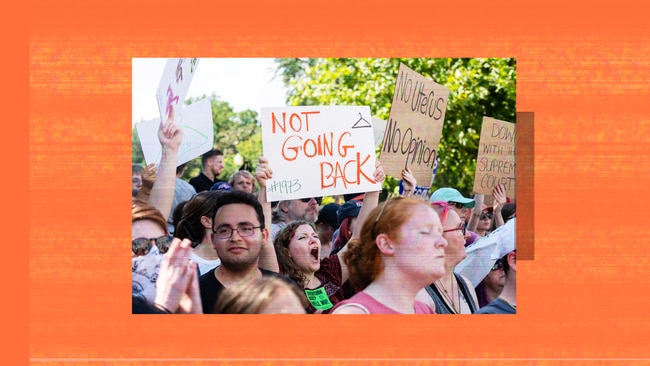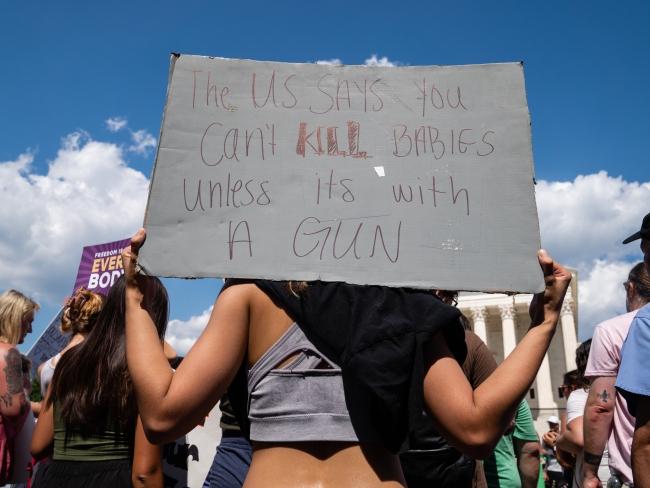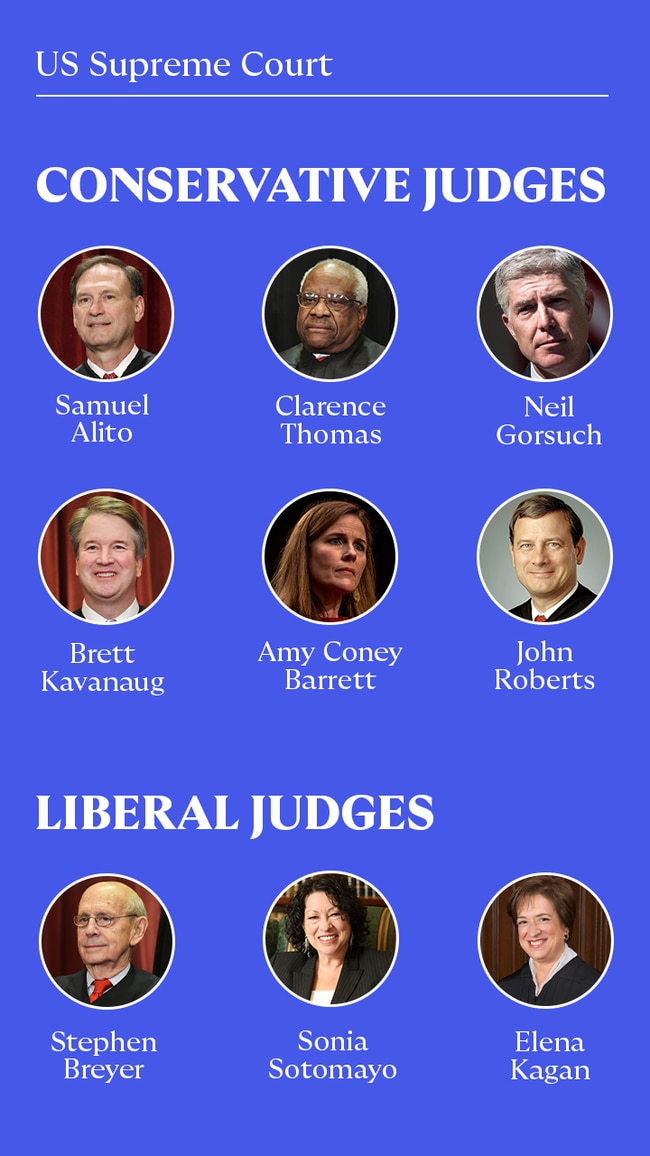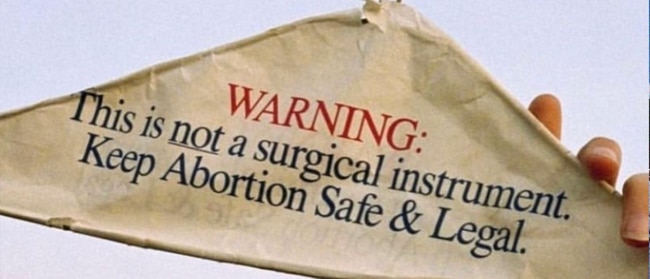States no longer united in abortion rights
About 36m women are facing a future with fewer rights and freedoms than their grandmothers in the US.

About 36m women are facing a future with fewer rights and freedoms than their grandmothers in the US.
Abortion is no longer a constitutional right for women in the US. In overturning Roe v Wade, the Supreme Court handed the individual states the final say on who can have an abortion and when.
It now reflects Australia's model where states and territories dictate the rules and regulations around family planning and healthcare.
How did this happen?
Let's head back to 1973. That's when the landmark Roe v Wade case saw the Supreme Court rule, by a vote of seven to two, that a woman's right to terminate her pregnancy was protected by the US constitution, much like gun ownership.
The woman at the centre of it was Norma McCorvey. She went by the pseudonym of 'Jane Roe'. She no job, safe partner, or means to travel outside of Texas for an abortion in a less restrictive state. So she turned to two lawyers looking to challenge the state's restrictive reproduction laws, who took the case against Texan district attorney Henry Wade all the way to the country's highest court.
The OG ruling gave American women an "absolute right" to an abortion in the first three months (the first trimester) of pregnancy but allowed for restrictions in the second trimester and for prohibitions in the final months.
Back in 1975, 75% of Americans said it should be legal in "all" (21%) or "certain" (54%) circumstances, according to a long-running survey by Gallup.
Back to 2022. This session of America's highest court has been dealing with a case called "Dobbs v Jackson Women's Health Organisation" which aimed to challenge the state of Mississippi's ban on abortion after 15 weeks.

On Saturday the bench, which has mostly conservative judges, ruled in favoured of upholding the 15-week ban and also effectively ended federal laws over abortion.
The court ruled 6-3 to uphold a Mississippi abortion ban being challenged in the case and 5-4 to overturn Roe.
The five justices were firmly in favour: Samuel Alito, Clarence Thomas, Neil Gorsuch, Brett Kavanaugh and Amy Coney Barrett. The latter three were appointed by former Republican president Donald Trump.

One of the judges, chief justice John Roberts, dissented and wrote a separate opinion saying whilst he supported the Mississippi ban, he would not have gone further than that.
“Surely we should adhere closely to principles of judicial restraint here, where the broader path the Court chooses entails repudiating a constitutional right we have not only previously recognised, but also expressly reaffirmed applying the doctrine of stare decisis [just a legalise way of saying 'precedent'],” Justice Roberts wrote.
There were three justices who disagreed with the majority - Stephen Breyer, Sonia Sotomayor and Elena Kagan. They wrote that they'd done so "with sorrow - for this court, but more, for the many millions of American women who have today lost a fundamental constitutional protection".
Polls now show 85% of Americans support unfettered access to abortions, 10 percentage points higher than it was in the 1970s.
President Joe Biden - who is a member of the Democrat Party - described it as "a tragic error" and urged states to enact laws to allow the procedure.

More landmark cases could soon come under the microscope which may threaten people's access to family planning services, marriage and birth control.
In his opinion, Justice Thomas wrote: "In future cases, we should reconsider all of this Court's substantive due process precedents, including Griswold, Lawrence, and Obergefell" - referencing three other historical decisions on the right to contraception, the repeal of anti-sodomy laws, and the legalisation of same-sex marriage respectively.
What happens now?
The debate since it was leaked the court were considering scrapping Roe v Wade back in May, has become incredibly heated. With protests occurring around the country, including the homes of some justices being vandalised as well as some abortions clinics and "pro-life" clinics being attacked.
Research from Planned Parenthood, a healthcare organisation which helps facilitate terminations, showed with Roe v Wade being wound back at a federal level it could mean abortion access is expected to be cut off for about 36 million women of childbearing age.
About half of the states are now expected to introduce new restrictions or bans.
"Twenty-two states have laws on the books that could ban all or most abortions as a result of the high court’s decision," stats from the Guttmacher Institute, a policy group that supports abortion rights and tracks national abortion statistics, reported on Sunday night.
Oklahoma lawmakers have already passed rules to make abortion illegal in nearly all circumstances - including rape and incest - that law will come into effect later this year. Some Mississippi MPs attempted to pass a bill that would allow individuals to sue anyone helping a patient cross state lines for an abortion.
Some US states have overlapping policies, while 16 states and Washington, D.C. have established protections for abortion rights.
"Unknown is whether lawmakers in states that haven’t taken similar actions already ultimately may propose and pass laws restricting or protecting abortion," The Wall Street Journal reported.
Within 48-hours of the overturn, about 13 states in the US began either formalising or passing laws to automatically outlaw abortion.
Including Texas, where 19 children were recently murdered at a school.
That state's chief law officer marked the decision by declaring it a "holiday" after it declared that abortion would be outlawed from fertilisation.
SCOTUS just overruled Roe & Casey, ending one of the most morally & legally corrupt eras in US history. Praise the Lord.
— Attorney General Ken Paxton (@KenPaxtonTX) June 24, 2022
Abortion is now illegal in Texas.
And today I’m closing my office—and making it an annual holiday—as a memorial to the 70 million lives lost bc of abortion.
The Governor - consider him Texas' Premier - Greg Abbott, who was against revising gun laws in order to stop massacres like the recent Uvalde shooting, also chimed in saying he looks forward to protecting kids from the "ravages of abortion".
His Democrat counterpart, Beto O'Rourke, who will contest the upcoming Midterm elections, was previously kicked out of a town hall style meeting for begging Abbott to consider tighter gun laws after the last school massacre and shared this vision of Texan lawmakers "celebrating".
We will not forget what Abbott has done to the women of Texas.
— Beto O'Rourke (@BetoORourke) June 25, 2022
We will defeat him. pic.twitter.com/HbaS5Ot2Uv
Many businesses around the country, including Estee Lauder and bank JP Morgan, have said employees requiring a termination will be able to seek access to one.
Patagonia will provide bail for employees who are arrested while protesting the decision.
Major corporations, including Aussie tech-company Atlassian, have also said they will pay for travel costs necessary for its employees to receive safe treatment.
Atlassian’s statement on today’s Supreme Court ruling in the USA. https://t.co/EmXz2fUMaN
— Mike Cannon-Brookes 👨ðŸ¼â€ðŸ’»ðŸ§¢ðŸ‡¦ðŸ‡º (@mcannonbrookes) June 24, 2022
Celebrities have also decried the decision. Lizzo will be donating more than $1m of her next tour profits toward women who require healthcare. Promoter Live Nation is chipping in more than $500,000.
Olivia Rodrigo called Lily Allen up on stage during her Glastonbury set to perform Allen's banger, F..k You, dedicating the song to the Supreme Court justices.
What's this got to do with us?
Well, not much as our judicial system is independent of government here in Australia.
Yet, as we said, the US ruling brings the "Land of the Free" more in line with the way we handle abortion - it's a state and territory issue. No where in Australia bans abortion the way the US's most strict states do.
However many of our female leaders have lamented the decision to overturn Roe v Wade.
Deputy Liberal Party Leader Sussan Ley said the decision to roll back women’s right to abortion in some US States is a “step backwards for women”.
Ley echoed the comments of former US President Bill Clinton that abortion should be "safe, legal and rare"
"I'm very discomforted by anything that puts a personal and sensitive issue that a woman has to grapple with in many instances, or a family has to grapple with, in the same sentence as criminal.”
Ley said the issue was handled differently in Australia, with nothing in the constitution about the right to terminate a pregnancy.
"It belongs with the states, so that has been an issue for them largely over many years," she said.
Prime Minister Anthony Albanese said it's a "setback for women’s health and the issue of women's safety. This is a decision that goes to the heart of a woman's right to control her own body. These are issues which aren't the subject of partisan political debate in Australia. And that’s a good thing."


